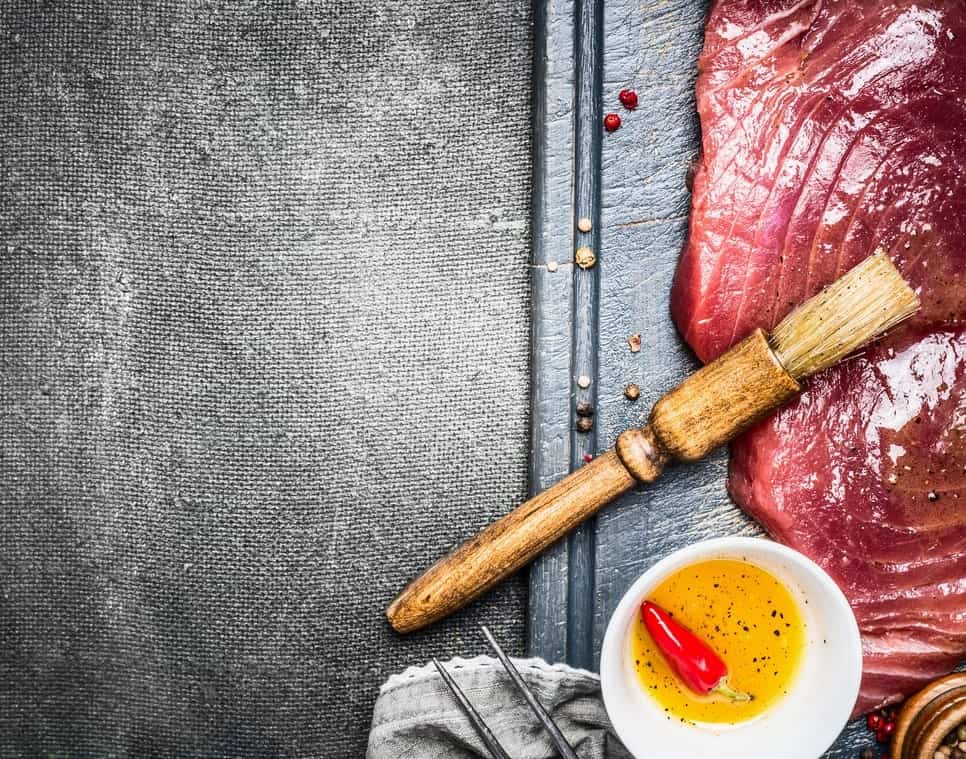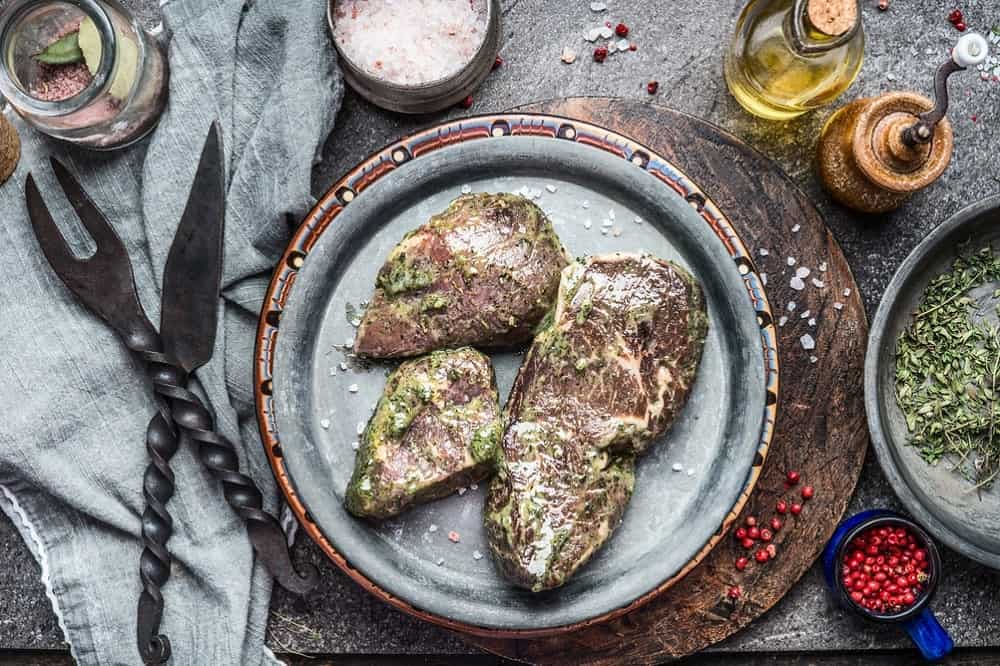If correctly seasoned, a nice steak will have a crispy exterior and a tender inside. The technique for marinating a steak involves precise time and uniform coating of the meat.
When marinating your steak, you’ll use a combination of spices and oils to create a flavorful marinade. I hope that this article will help you find an answer to your query, “Should you add oil on the steak before grilling?”
Should I Put Oil on the Steak Before Grilling?
Oil is brushed over the steak before grilling because it aids in increasing the temperature on the surface of the meat from the heat source, resulting in a faster and better sear; to “lubricate” the steak; to maintain maximum moisture, and to make it more tender when cooked.
How to Choose the Best Oil for Grilling Steak
Before making your final choice, let’s talk about a few factors you should know when choosing an oil for cooking your steak. There are a few things to watch and a few kinds of oil that we don’t suggest using in particular.
Before we get started, let’s talk about the oils you shouldn’t use.
Olive oil, extra-virgin olive oil, and conventional vegetable oil have low smoke points compared to other cooking oils. They often vary between 300 and 350 degrees Fahrenheit, which is just not hot enough for steak and may easily result in problems with burning oil, which will damage the taste of your steak.
Now, here are some of the aspects that you should consider.
1. Levels of Smoke Point
If you are frying, grilling, or searing steak, the smoke point of the oil you use is highly essential to consider! Unfortunately, this will happen when you are far into your cooking and inundated with smoke.
The problem is, it doesn’t only impact the air quality; it also affects the taste of the meal you’re cooking! You will want to use an oil with a high smoke point for this project (above 400 F).
Seed oils, plant oils, nut oils, and even extra light olive oil are some of the finest choices in this category of oils and fats.

2. Ingredients
Ingredients may make a difference in the outcome. Pure oils are always the best choice, in our opinion. For starters, if there are many additional components or processing, the smoke point may be adversely impacted (lowered).
The components may influence the taste and the health, and nutritional value of the oil. If you are concerned about your health, we suggest that you search for clean and natural alternatives. What’s the point of ruining something already good?
3. Variety
There are certain particular oils that we have provided you for certain circumstances that we believe would work best in those situations. However, you should be conscious that most of these choices are very flexible and will work for just about any type of cooking you may be employing.
We want you to take away from this because the tastes and smoke points of various kinds of oil may differ, so keep this in mind when you make your selection.
When to Season Steak Before Grilling?
Seasoning the steak with salt and pepper at room temperature 40 minutes before grilling will result in the most delicate tasting steak possible. If feasible, let your seasoned steak marinate in the refrigerator overnight to get the best taste.
If you leave it for a lengthier period, the steak’s tissues may reabsorb the salty brine. For those who don’t have 40 minutes to spare, you should season your steak while it’s still at room temperature before cooking it.
The outer coating of salt aids in the creation of a brown, crusty surface while searing the meat. Allowing the salt to remain for a few minutes causes puddles of water to form on the surface, which reduces the quality of your meat. Most chefs agree that Kosher salt is the most acceptable option for seasoning steak, just in case you were curious about this.

Before Grilling, Should You Marinate Your Steak?
While marinating your steak is not required, it may enhance the taste of your steak by imparting certain distinct characteristics that are complementary to specific meals.
For example, in the case of an Asian-inspired meal, you may wish to employ a soy sauce marinade to add genuine aromatics to your preparation. Some individuals also swear by marinating tiny pieces of beef for use in kabobs, which they say are excellent.
You should be conscious that there are trade-offs when marinating your steak, however, before you begin. While marinades enhance the taste of your steak, they will make it difficult to get a crispy brown crust on the surface of the steak.
Additionally, marinades take much longer to penetrate your meat than a conventional salt rub. If you marinate your steak for many hours in the fridge, your marinade will only permeate the exterior layers of the meat.
Your taste preferences influence the decision to marinate a steak, the meal you’re preparing, and the cut of steak you’re using. However, you can use marinades for special meals that need more taste, while most chefs suggest an essential salt and pepper rub for all types of steak.
FAQs
1. What kind of oil do you put on the steak before grilling?
Nut oil, canola oil, and extra light olive oil are all excellent choices for grilling or frying steak because they all have high smoke points (above 400 degrees). In general, the higher the smoke point of an oil, the lighter the color of the oil is.
2. Why do chefs put butter on steak?
The addition of butter to steak enhances the dish’s richness while also softening the charred surface, making the meat tender. On the other hand, an excellent steak butter should improve the taste of the steak rather than hide it.

